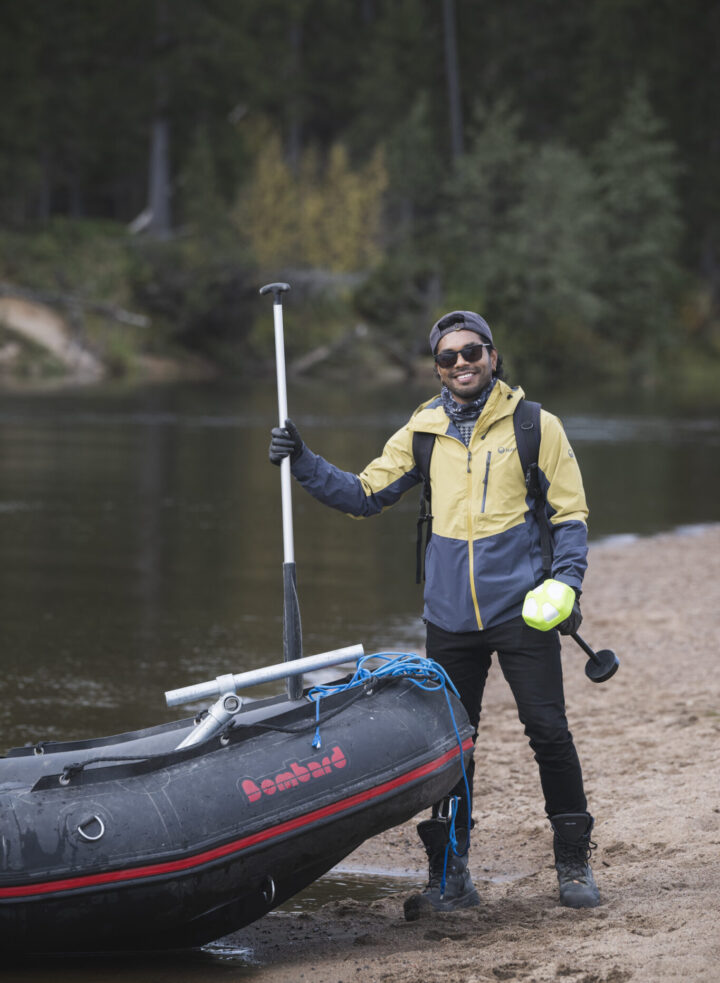My PhD Dream is Now a Reality – Navigating Finnish Work Culture, Academia, and Nature
“Hey, everyone! Moi kaikki!! Hej allihopa!!!
I officially started my Ph.D. in Finland last year on my long-awaited topic, “Nature-based solutions and urban hydrology!” I am pursuing a double doctoral degree at the University of Turku and Lund University. This is a dream come true, and I can’t wait to take you along on this journey. In today’s vlog, I’ll share how it felt to get this position, my first thoughts about moving to Finland, and tips for adapting to life in Turku, Finland. Let’s go!
Knowing about UTU-GreDiT
I completed my master’s in Water Resources Engineering at Lund University, Sweden. After graduation, I actively searched for Ph.D. positions and strategic roles in water, hydrology, and the environment across municipalities and companies. Meanwhile, my supervisor and I worked on publishing a paper based on my thesis, which focused on the potential of nature-based solutions (NBS) to mitigate urban flooding under current and future climate conditions.
Living in Malmö, a city tackling urban flooding with NBS, I had firsthand exposure to real-world applications of my research. This deepened my interest in urban hydrology and climate resilience. One morning, I received an email from my master’s supervisor about a Ph.D. opening at UTU-GreDiT. To my surprise, it was perfectly aligned with my interests and even offered a cotutelle Ph.D., allowing me to earn a double degree, including one from my former university.
Excitement of Getting the Ph.D. Position and how I felt
“I still remember the moment I opened the email—it was a warm spring morning in Malmö, and I was filled with pure excitement and disbelief. After months of applications, interviews, and waiting, I finally made it! I was both thrilled and nervous because moving to a new country, especially for a long-term academic journey, is a huge step.”
Preparation and moving to Finland
Finally, it was a summer full of joy, happiness, excitement, and waiting to start my Ph.D in a new country, a new chapter, a new life. I was not afraid of the Finnish lifestyle as I had a very good friend in Malmö who was Finnish and shared many Finnish cultures and stories, often with us on many occasions. Though little paper works, visa works and preparation was there but they were mixed of interest, curiosity and a pinch of fear.
Finland is known for its excellent education system, research opportunities, and work-life balance. Plus, they have Santa’s home, reindeer, archipelagoes, forests, and, of course, the cozy Finnish saunas! What was uncommon?? Here, the language is different from my mother language, English, and even Swedish.
When my ferry arrived in Turku, I felt nostalgic and perhaps a bit missing my friends back in Malmö. But an opportunity to learn a new culture, meet new people, and obviously to be myself and explore it at my own pace, which I always enjoy a lot.
What can I suggest?? Surely, I believe anyone should learn about the new country, including its demography, geography, weather, culture, food, and history, and have a will to integrate and adapt to it concerning the local culture and one’s boundary.
Adjusting to Life in Finland
I did a lot of biking and walking around the city and its nearby remarkable places in August. It was a lovely warm summer with sun (surprisingly and unexpectedly for me). I tried several local pastries and breads such as Karjalanpiirakka, reikäleipä, and limppu. And you know what was more exciting?? Picking blue berries in the forest and eating apples from wild apple trees. To know the Finnish culture, I observed people on the street and ended up several times in pubs and clubs in the summer evenings, where I met some warm-hearted Finnish people who were happily sharing tips on local culture. My colleagues helped me a lot to know more about them and adjust to the locals. Here are some tips from me:
- Getting Used to the Weather
If you’re moving to Southern Finland, be ready for cold winters and beautiful summers! The darkness of winter can be tough, but Finnish people embrace it with cozy indoor vibes and plenty of outdoor activities like ice skating and cross-country skiing. - Most important practicalities
Population registration with your address, opening bank account, getting used to strong identification with bankID, visiting tax office and getting your tax card (take advice from HR), Office key, laptop etc. Be careful about Finnish door locks and always check if you take in keys before stepping out of your apartment, and keep a key at a safe place at your office or maybe with any close friend or colleague. - The Finnish Culture
“Finns are friendly but reserved. Small talk isn’t common, but once you make friends, they are super loyal! Oh, and personal space is a big thing here—so no unnecessary hugging! and be aware of anyone’s boundaries, please. “. Leave your trash in designated bins, follow schedules and rules, and practice Modesty to be integrated with local culture. At the workplace, Coffee and Pulla time is a social event to chat with your colleagues and get to know each other. - Learning Some Finnish (But Don’t Worry Too Much)
“Most people speak English fluently, but learning basic Finnish phrases helps! ‘Kiitos’ (thank you) and ‘Moi’, ‘Moro’, ‘Moikka’ (hello) go a long way.” - Public Transport & Biking
Turku has good public transport. Get a travel card and explore! Don’t forget to use your student ID card to get a discount on Föli. Also, biking is super popular here. You can use the “Donkey bike. It’s wise to download apps for Föli and Donkey Bikes and check offers and prices and decide on your demands. However, you can get a bike for 2euros/h, or daily or monthly offers can be purchased. (This service is closed from November to April). Do you love biking in winter? Be careful about sleeper ice, bike slowly, or for the best results, use winter tires. - Enjoying Nature & Sauna
Finland is all about nature! There are lakes, forests, and national parks everywhere. And yes, Finns LOVE their saunas. It’s the best way to relax. Use your swimming costumes, take towel, drinking water, and yeah try taking dips in cold water or at least cool down your body on breaks in Sauna. Don’t forget to check out the Ruissalo and Hirvensalo islands and explore nature in the summer. You may have a bit of good luck to meet wild deers in Ruissalo. When visiting beaches, please carry your trash with you and don’t forget to take sunscreen lotion.
Starting My Ph.D. Journey: Reflections and Insights
“Starting a Ph.D. in Finland was both exciting and challenging. Finland is an amazing place to learn and grow.”
You are in a country of freedom, modesty, and individualism. Smell it, taste it, and enjoy your freedom, but practice modesty. It is seldom here that anybody is going to judge you. So, for me, this was a wonderful environment to begin my Ph.D.
1. Practicalities and Settling into the Office
From day one, my supervisor, HR personnel, and coordinator played a crucial role in helping me transition smoothly into my new role. The first week was all about handling practical matters—setting up my workspace, understanding procedures, and enrolling in relevant courses and training. It was also the perfect time to dive into academic literature, exploring what had already been done in my field and by whom, where, and how. This initial phase helped shape my research ideas. I treated my Ph.D. like a regular job from the start, maintaining structured working hours and balancing work with my personal life.
2. Overcoming Challenges and Fear
Challenges are a part of every Ph.D. journey, but I firmly believe that with time, everyone finds their rhythm. Engaging with colleagues, seeking guidance from experienced researchers, and discussing ideas with supervisors and peer groups proved to be the best way to navigate uncertainties. At first, the sheer number of groups, platforms, and resources felt overwhelming, but prioritizing the most relevant ones helped streamline my focus. I’ve learned that no question or opinion is foolish—what matters is expressing them with confidence, being open to feedback, and respecting diverse viewpoints. As I remind myself:
“I don’t need to know everything, but I am open to learning, seeing from different perspectives, and staying curious.”
3. Is It Normal to Feel Lost or Frustrated?
Absolutely. Imposter syndrome, frustration, and moments of self-doubt are all part of the process. Doctoral researchers are human, after all. At times, ideas seem so clear in my mind, only to vanish just as quickly. To counter this, I’ve found that keeping detailed notes—jotting down ideas, to-do lists, and progress updates—helps immensely. Documenting my thoughts daily has become a valuable habit, preventing great ideas from slipping away.
4. Work-Life Balance Matters
Most importantly, I remind myself that a Ph.D. is a job, not my entire life. Taking breaks, enjoying personal time after work, and making space for hobbies and relaxation are essential. Mental well-being should never be overlooked. Even during work hours, short breaks—whether for coffee, a short walk, or simply stretching—make a difference. Physical activity is a personal priority for me; whether it’s sports, workouts, biking, or just a walk, staying active is key to maintaining balance and productivity.
 Co-funded by the European Union. Views and opinions expressed are however those of the author(s) only and do not necessarily reflect those of the European Union or European Research Executive Agency (REA). Neither the European Union nor REA can be held responsible for them.
Co-funded by the European Union. Views and opinions expressed are however those of the author(s) only and do not necessarily reflect those of the European Union or European Research Executive Agency (REA). Neither the European Union nor REA can be held responsible for them.
